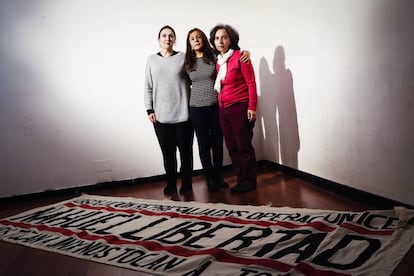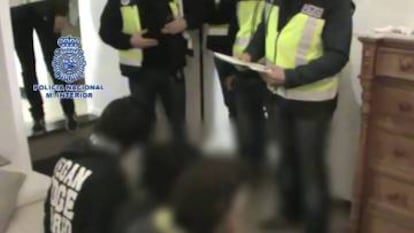Terrorists or troublemakers?
In 2015, six anarchists were arrested and one sent to prison where he remains, despite flimsy evidence
Spanish police have released a report on Operation Ice, describing the arrest of six students in Madrid on November 5, 2015. Ranging in age from 20 to 26, the students belong to Straight Edge or SXE, an anarchist group that promotes a vegan lifestyle and abstention from drugs and alcohol. Their supposed crime? Setting fire to two banks as well as storing materials to make homemade explosives.

The case has more or less fallen off the radar but the group’s alleged leader, Juan Manuel Bustamante, 26, also known as Nahuel, is still in jail and coping with a tough prison regime designed for hardcore terrorists. While his colleagues have been released on bail, Bustamante has been moved five times and denied bail almost as many. When the trial finally comes up, the students will stand in the dock on four terrorism charges that could see them put behind bars for 35 years. But the indictment – particularly when it comes to the question of the attacks on banks – is far from convincing.
To anyone familiar with the law, it is obvious that what is happening is an aberration
Manuel Cancio, Law professor
Straight Edge is just one of a number of mysterious so-called terrorist groups that have emerged in Spain following reforms to the Penal Code in March 2015, which, after agreement between the ruling Popular Party and opposition Socialists, modified the definition of terrorism with a view to combating jihadism. Terrorism can now apply, among other things, to acts of civil disorder and so when, for example, two policemen and their partners were attacked in a bar in Alsasua, Navarre, in October, their attackers found themselves labeled as terrorists. This triggered debate. Now Bustamante’s indictment is under the same kind of scrutiny, as are the rulings of Judge Carmen Lamela, who is involved in both cases.
The Straight Edge anarchists are accused of setting fire to two Madrid bank branches, one in 2013 and the other in 2015, despite the fact there is no direct evidence linking them to the crime. What led the police to become “convinced” of their guilt was that the group’s graffiti had appeared at the scene of one of these crimes two weeks earlier, posts on social networks had urged bank sabotage and a member of the group lived close to one of the bank branches in question. The group’s ideology, their anti-establishment rants on Twitter and Facebook as well as several videos on YouTube aiming to “subvert the Constitution” have also been thrown into the mix. According to Judge Lamela, all the available evidence points to the group’s involvement in what amounts to terrorism.
Meanwhile, the materials seized during police raids and alleged to be for the manufacture of explosives consist of smoke-generating canisters, flares and firecrackers – all freely available on the open market. But the police report goes on to say that the powders these products contain could be used as explosives if placed in the right container. However, the group has not been accused of planting any of these materials while substances confiscated during the raids have been found to be cooking and cleaning products and, according to police, are not ideal for making explosives, although experts suggest they could be used to make smoke bombs.
Other evidence against the students, particularly Bustamante, includes the fact that they support the Okupas squatters movement and have been involved in demonstrations such as Surround Congress and March for Dignity. Bustamante has been arrested on three occasions, accused of disturbing the peace.

With its roots in 1970s America, the Straight Edge movement is named after a song by the punk band, Minor Threat, which rails against the prevalence of alcohol and drug abuse in punk and anarchist movements. “Freedom doesn’t smoke, drink or sniff; freedom conquers” is one of the slogans on the Madrid SXE website, promoting a puritanical approach reminiscent of the original anarchists who saw alcohol as another capitalist tool to enslave the masses. They also promote respect for animals via veganism and deny the existence of a species hierarchy.
Madrid Straight Edge was a splinter group of the 15-M student movement of 2011, which made headlines worldwide. Their radical approach challenges the system and “ the mediocre reality” we live in. They consider themselves anti-fascist and libertarian. As far as Judge Lamela is concerned, the messages they post on social media “are an attempt to erode the prestige and credibility of the State, particularly its security forces” as well as being a call to arms. As they act collectively, the judge considers them to be an organization with Bustamante at the helm.
In response, the families of the accused gather once a week in the Puerta del Sol in the center of Madrid to demand Bustamante’s release. “When I tell people what’s happened, they look skeptical,” says Natalia Bosch, the mother of one of the Straight Edge six, Candela Betancor. “They assume they must have done something if they are on a terrorism charge and, of course, I would say they were innocent because I’m the mother, but when I hand them the indictment, they can hardly believe their eyes. It’s madness. There’s absolutely nothing, not one shred of evidence. It’s just about what they posted on social media. I used to believe in the police and the justice system, I studied law, I’ve worked as a lawyer but now I’m under no illusions.”
In total, 46 people have been arrested and accused of terrorism since the demise of the terrorist group ETA
Meanwhile, three legal experts on terrorism have analyzed the indictment and admit to feeling perplexed. “I get the idea that once again the definition of terrorism is being trivialized and the measures devised for Daesh or ETA are being applied to groups capable of disturbances and damage but not violence against the person,” says Manuel Cancio, professor of criminal law at Madrid’s Autonomous University. “The reforms last year have allowed this to happen and a lot more into the bargain. They have completely obscured our idea of what terrorism is.” Cancio goes on to say that article 573 allows for inferences to be made about certain behavior and defined as terrorism in a way that would previously have been impossible. The indictment, he says, “refers to ideology, tweets, books and very little that’s important, namely which explosives were in their possession, what offenses they had committed and which they were planning. I don’t see any evidence of serious crimes that could be labeled as terrorism, a crime that carries a sentence of at least five years.”
José Luis Díez-Ripollés, a professor of criminal law at Malaga University, confirms that the recent reforms allow for small groups involved in minor unlawful acts to be considered as criminal gangs. “It’s certainly the case that with such all-encompassing interpretations, it isn’t hard to find a criminal gang or group of terrorists if criminal or terrorist means someone disturbing the peace, but it’s no coincidence that this charge sheet is extremely vague and focuses almost entirely on social media activity. What we have here is probably a group that has never got beyond promoting anarchist ideology via social networks.”
According to Carmen Lamarca, a professor of criminal law at Madrid’s Carlos III University, the indictment is nothing short of absurd. “One thing is an anti-establishment group voicing opinions, something that is protected by freedom of speech,” she says. “Another thing is providing proof that they commit crimes and use violence, both of which seem highly questionable.”
This charge sheet is extremely vague and focuses almost entirely on social media activity José Luis Díez-Ripollés, Law professor
The reforms mean a shift in the way terrorism is tackled by investigating individuals and small groups considered to be disturbing the peace, subverting the constitution or generally terrorizing the public. And though there is little evidence to prove it, Straight Edge is accused of subverting the Constitution.
“Apart from anything else, the attacks they are accused of are small scale, causing no personal injury,” says defense attorney Daniel Amelang. “You can’t even say they have disturbed the peace because the incident was not covered in the press.” Another of the defense lawyers, Eduardo Gómez, adds, “It’s the so-called criminal law of the enemy – you are accused more for who you are than for what you have done.”
For the last three years, in the wake of ETA’s demise, the police have been waging war against the anarchist world and, more recently, applying the new interpretation of terrorism to those they arrest. Operation Ice is the last of five such operations. In total, 46 people have been arrested and accused of terrorism during this time.
The police went onto the offensive after two homemade un-detonated bombs were found in the Almudena Cathedral in Madrid in 2013 and others exploded in the Basilica of Our Lady of Pilar in Zaragoza, causing damage to the building and damaging the hearing of one bystander. The Director-General of the National Police, Ignacio Cosidó, made a point at the time of saying that the fight against anarchy was a priority. Those arrested in subsequent operations have been accused of terrorism and a tenuous link to the Zaragoza bombers established by uncovering common membership of the umbrella group GAC – Coordinated Anarchist Groups – in the case of Straight Edge, the accused had GAC pamphlets.
While the Zaragoza bombers were sentenced to 12 years last March, they were not condemned as terrorists and the sentence has since been reduced to four-and-a-half years.
In light of this, the subsequent arrests and charges seem excessive, to say the least. “To anyone familiar with the law, it is obvious that what is happening is an aberration,” says Cancio, referring to the sweeping new definition of terrorism. “Other countries like ours have nothing like it.”
In October 2015, a week before Operation Ice, another operation called Pandora 2 was carried out in Barcelona, with nine arrests, but the charges were dropped this summer due to a lack of evidence. The other two operations pending trial are Pandora 1 dating back to December 2014 and La Piñata, which took place in March 2015.
Leaps of logic
The defense for the accused in Operation Ice has bemoaned “the warped and flimsy” nature of the police reports. As far as materials for homemade explosives are concerned, all the substances seized during the raids have turned out to be no more than sugar, vinegar and bicarbonate of soda while a jar containing a strange liquid labeled Lombarda, was analyzed and found to be stock made from Lombard cabbage.
Leaps of logic have also been made about an empty bottle of beer discovered in the home of one of the accused. “It would not be relevant if it were not for the group’s stance on alcohol and drugs, suggesting no other reason for having this bottle than to make a Molotov cocktail.”
Investigators also deduced from the fact that this particular member of the group kept a wooden and a metal box that he was in charge of the organization’s finances. Among the confiscated items, there are also lyrics from songs by the pro ETA band Piperrak slating the police. Other deductions relate to graffiti associated with the anarchist group in the vicinity of the attacked bank, some of which was of a feminist nature, suggesting that at least one member of the group was a woman.
English version by Heather Galloway.









































